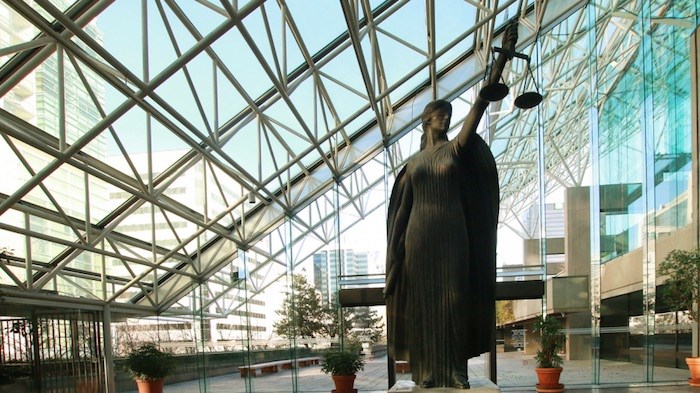An Indigenous man who burned his house down with his mother can’t argue he was punished twice for being both banished by his First Nation and jailed by the Crown, the Court of Appeal of B.C. has ruled.
The May 2 decision came as part of a ruling rejecting an application by Eddy Walter Cliffe — otherwise known as Hǝ' Yǝł' Kǝn — to extend the time to appeal his conviction in burning down his own house in June 2019.
Hǝ' Yǝł' Kǝn pleaded guilty to intentionally or recklessly causing damage by fire to a house on the reserve lands of the Wei Wai Kum First Nation, also known as the Campbell River Indian Band.
The Wei Wai Kum First Nation also banished him from its lands for six months.
Hǝ' Yǝł' Kǝn claimed in his appeal that he was punished twice for the offence with both the banishment and the prison time — known as double jeopardy.
The decision noted that Hǝ' Yǝł' Kǝn owned the house, which carried a mortgage secured by the Wei Wai Kum, but he defaulted on the mortgage, which was then paid out by the First Nation.
Hǝ' Yǝł' Kǝn and his mother burned down the house after being told that Wei Wai Kum would be taking control of the house and selling it. He pleaded guilty to the offence in provincial court, where he was represented by a lawyer, the decision said.
On Oct. 1, 2021, he was sentenced to 21 months in prison and 18 months of probation.
His mother, Gwen Olney, had also pleaded guilty and was handed the same sentence.
Writing for the unanimous three-judge panel, Justice Joyce DeWitt-Van Oosten said the onus was on Hǝ' Yǝł' Kǝn to show he had been placed in a double-jeopardy situation.
The judge said she had no confidence Hǝ' Yǝł' Kǝn would produce the required evidence for a resolution of a double-jeopardy inquiry by the court.
“Some of the material he placed before me may be relevant to the analysis (for example, the history of Indigenous-Crown relations in Canada and Indigenous law-making authority),” DeWitt-Van Oosten said. “However, it does not address the specifics underlying the Wei Wai Kum’s decision to banish the appellant from his reserve lands.”
For example, the judge wrote, there is no material showing the specific circumstances considered by the First Nation when choosing to banish, or the intended objective of the banishment. “Was the appellant banished as punishment specific to the house fire? Or, did the First Nation have other conduct in mind? Rather than punishment, was the appellant banished as a preventative measure to protect the community from the potential for future harm? These are all questions that would need to be answered in a double jeopardy inquiry.”
“This is a critical piece,” she said.
The judge wrote that while Hǝ' Yǝł' Kǝn raised issues that are “not without significance” and the appeal process is difficult for someone who is self-represented, “it is generally not in the interests of justice to grant an extension where there is no reasonable possibility the proposed appeal will succeed.”
Hǝ' Yǝł' Kǝn’s appeal of his sentence remains outstanding, and the judge noted that he would still be able to raise the banishment as a factor for consideration at that appeal.
In February, Hǝ' Yǝł' Kǝn won his application to have a publicly funded lawyer appointed in the appeal of his sentence.
A summary of the February Court of Appeal of B.C. judgment said his request for a publicly funded lawyer in appealing his conviction was denied, but that the appeal of the sentence is “arguable” and a lawyer has been appointed to represent him.
With files from Jeff Bell, Times Colonist

